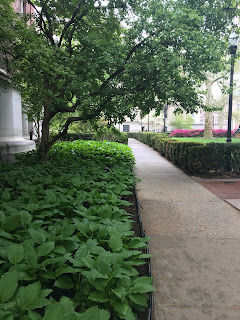 The first year is done and so, in my effort to procrastinate on working on the dreaded certification exam that we have been hearing contradictory information about all year (the exam is required for first year doctoral students in my program to determine if we get to stay), I thought I would take some time to reflect on the other kind of learning that has happened this year.
The first year is done and so, in my effort to procrastinate on working on the dreaded certification exam that we have been hearing contradictory information about all year (the exam is required for first year doctoral students in my program to determine if we get to stay), I thought I would take some time to reflect on the other kind of learning that has happened this year.This is the learning that is not within the curriculum. It is not what is necessarily intentionally taught but is the growth that happens alongside the theories and articles and papers and statistics that we learn in the classroom. In education, we call this the hidden curriculum, which usually refers to the ways in which children are socialized to learn their "place" in society, such as along class lines. Making children walk the halls in quiet, orderly lines, emphasizing Standard English over student dialects are ways in which the hidden curriculum silently, subtly, teaches children what society demands of them.
For me, the hidden curriculum at Teachers College has fortunately been positive (this has been intentional). In this past year, I have become more confident in my place in the world and feel closer in discovering what part I want to play in it. Thanks to some wonderful professors, the doubts that I came into the program with (about not belonging, about being dumb, about my incompetence) have become manageable. I would say they are completely gone but I know that those thoughts will likely come and go as I face new challenges.
We have been taught to think critically about everything, to never accept that anything has to be the way it is. We have learned to think transformatively instead of with resignation. Here, surrounded by people who think critically of everything, I have realized that there are subtle ways in which we are disciplined into thinking certain ways and that it is our job to fight back against this.
Ironically, the criticality has led me to also run away from the Academy in some ways. I appreciate people who do not spend their entire lives living in their heads. They are people of action and of joy. Being critical can make you forget what joy means at times. Sometimes a five minute conversation about our favorite types of pants is very necessary.
It has been interesting reflecting on the many ups and downs. During a week when it seemed that everything was going amazingly well, I reflected on the ups and downs and knew that this winning streak would come to an end (which it did). But the converse to that is that a bad streak must end some time too. Learning to live in calm serenity with that is my ultimate goal.
 I have learned that nothing we do is done in isolation. We are and must work with others to create lasting change. Every paper I have written this year, every assignment I have written, every presentation I have given, every test I have studied for, has been done with help from others. This thought has been very important for me. It reminds me that no matter what work I accomplish, it will be done as part of a collective. I am thus humbled and grounded and grateful.
I have learned that nothing we do is done in isolation. We are and must work with others to create lasting change. Every paper I have written this year, every assignment I have written, every presentation I have given, every test I have studied for, has been done with help from others. This thought has been very important for me. It reminds me that no matter what work I accomplish, it will be done as part of a collective. I am thus humbled and grounded and grateful.When the program started I, out of pure self preservation because I felt I did not belong, decided that I did not need friends. And the result was that for the first seven months, I was miserable and hated living in NYC. But now I've come to feel the love of my classmates and coworkers. The city doesn't feel as lifeless as it did before. I will never be a New Yorker, but I think I can handle the next few years. Let's see what Year 2 has to offer.


Comments
Post a Comment